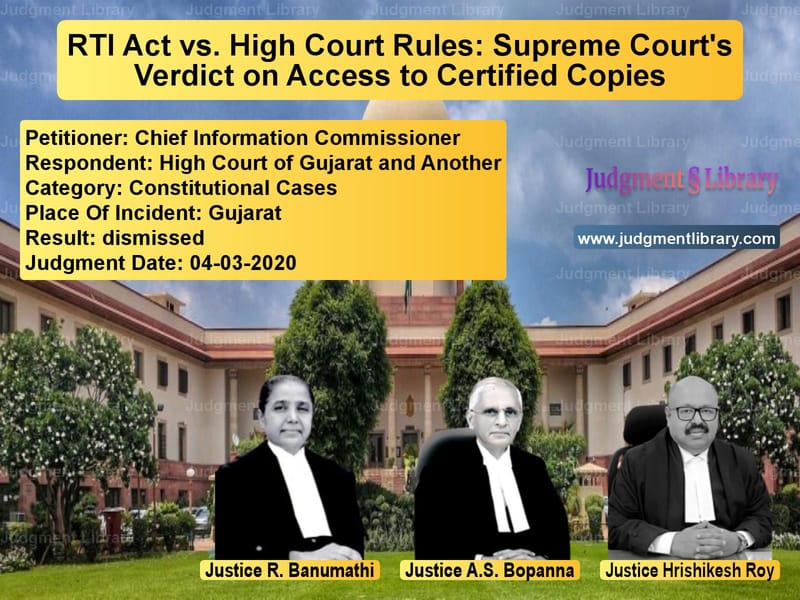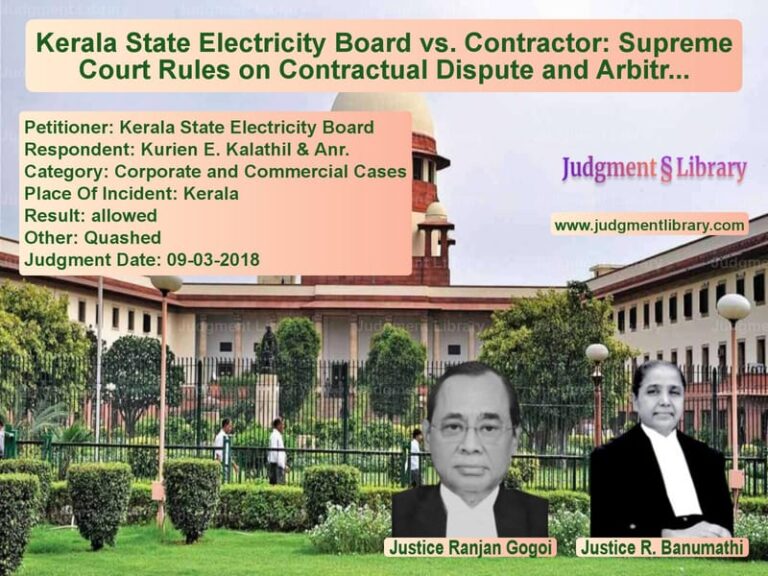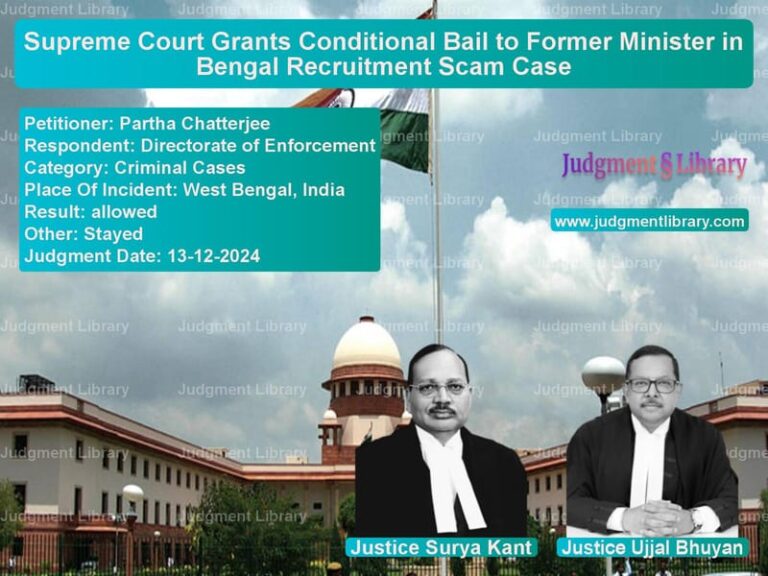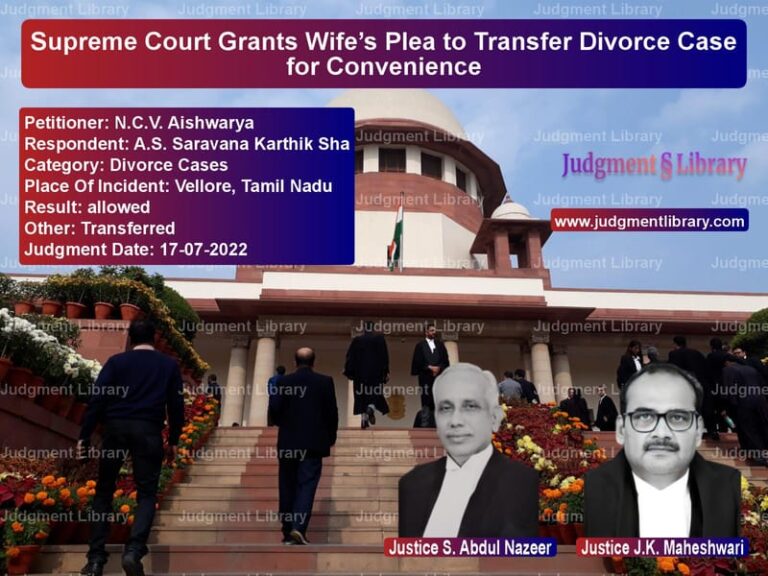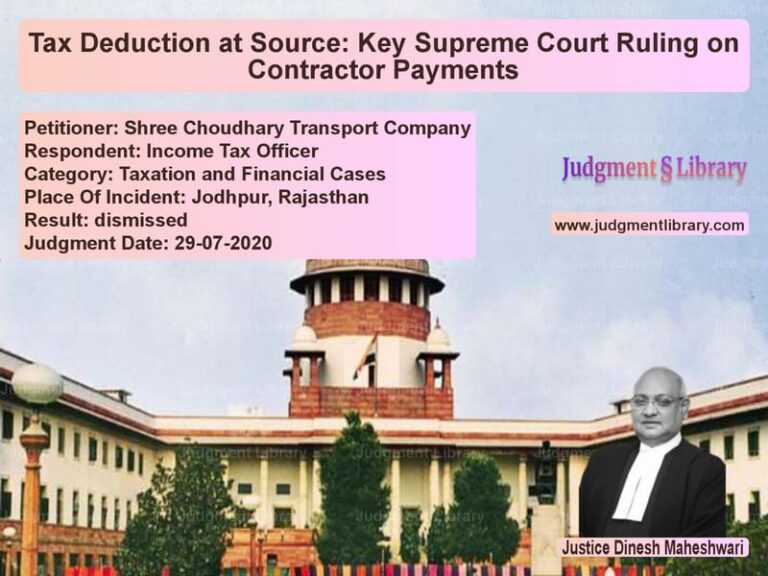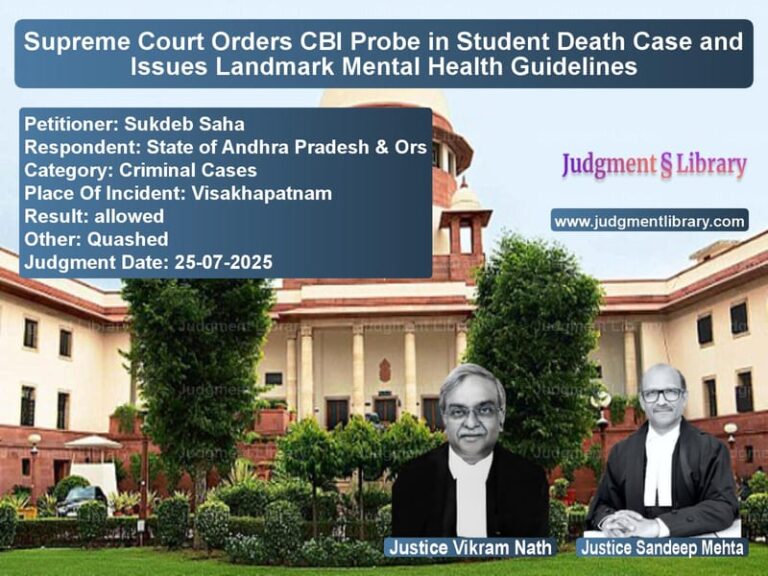RTI Act vs. High Court Rules: Supreme Court’s Verdict on Access to Certified Copies
The case revolves around the right of a third party to obtain certified copies of judicial documents under the Right to Information Act, 2005 (RTI Act), without following the Gujarat High Court Rules. The Supreme Court examined whether the provisions of the RTI Act override the Gujarat High Court Rules, which require third parties to file an affidavit stating the grounds for requesting certified copies.
The matter began with an RTI application dated April 5, 2010, filed by respondent No.2, seeking certified copies of certain judicial proceedings. The Gujarat High Court’s Public Information Officer (PIO) informed the respondent that obtaining such copies required adherence to the Gujarat High Court Rules, which mandated an affidavit explaining the need for the documents. Dissatisfied, respondent No.2 filed appeals under the RTI Act, ultimately reaching the Chief Information Commissioner (CIC), who directed the Gujarat High Court to furnish the requested documents.
However, the Gujarat High Court challenged this directive in a Special Civil Application, arguing that certified copies could only be provided under the High Court Rules. The High Court ruled that when a specific procedural rule exists, the RTI Act cannot be applied arbitrarily to bypass it.
Petitioner’s Arguments
The Chief Information Commissioner, represented by Senior Counsel Preetesh Kapoor, argued:
- Section 6(2) of the RTI Act states that an applicant is not required to provide reasons for seeking information, whereas the Gujarat High Court Rules mandate an affidavit explaining the necessity of obtaining copies.
- Section 22 of the RTI Act provides that it overrides all other laws in case of inconsistency.
- The Gujarat High Court Rules were framed under Article 225 of the Constitution and are subordinate to parliamentary legislation such as the RTI Act.
- The Supreme Court’s ruling in Central Public Information Officer, Supreme Court of India v. Subhash Chandra Agrawal was cited to support the argument that the RTI Act must prevail over any conflicting procedural rules.
Respondents’ Arguments
The High Court of Gujarat, represented by Counsel Aniruddha P. Mayee, contended:
- The Gujarat High Court Rules provide a structured process for obtaining certified copies, ensuring that judicial records are not misused.
- These rules are not inconsistent with the RTI Act but complement it by ensuring transparency while protecting sensitive information.
- Information on the judicial side is distinct from administrative records and should be accessed through judicial rules rather than the RTI Act.
- Requiring an affidavit prevents frivolous requests and potential misuse of sensitive judicial documents.
Supreme Court’s Observations
The Supreme Court examined whether Rule 151 of the Gujarat High Court Rules, which requires third parties to file an affidavit for obtaining certified copies, was inconsistent with the RTI Act. The Court concluded:
- The Gujarat High Court Rules do not deny access to information but merely establish a structured process for obtaining it.
- The RTI Act does not intend to override pre-existing laws that already ensure access to information through prescribed mechanisms.
- Many High Courts have similar procedural rules requiring affidavits or judicial scrutiny before granting third-party access to judicial documents.
- Applying the RTI Act to judicial records without following court rules could lead to misuse of confidential information.
Verbatim Court Observations
The Supreme Court stated:
“Rule 151 of the Gujarat High Court Rules stipulating a third party to have access to the information/obtaining the certified copies of the documents or orders requires filing an application/affidavit stating the reasons for seeking the information, is not inconsistent with the provisions of the RTI Act but merely lays down a different procedure as the practice or payment of fees, etc. for obtaining information. In the absence of inherent inconsistency between the provisions of the RTI Act and other law, the overriding effect of RTI Act would not apply.”
Furthermore, the Court noted:
“The information to be accessed/certified copies on the judicial side to be obtained through the mechanism provided under the High Court Rules, the provisions of the RTI Act shall not be resorted to.”
Final Judgment
The Supreme Court dismissed the appeal, upholding the Gujarat High Court’s decision that certified copies must be obtained under the Gujarat High Court Rules and not through the RTI Act. The Court ruled that where an effective and established mechanism exists, the RTI Act should not be used as a parallel mechanism.
Implications of the Judgment
- Judicial records cannot be accessed directly through the RTI Act; applicants must follow High Court rules.
- The decision ensures that sensitive legal documents are not misused by unauthorized individuals.
- It reaffirms that procedural laws established under constitutional provisions remain valid unless they directly contradict parliamentary legislation.
- The ruling provides clarity on the intersection of the RTI Act and judicial processes, reinforcing that procedural rules must be followed when accessing court documents.
Petitioner Name: Chief Information Commissioner.Respondent Name: High Court of Gujarat and Another.Judgment By: Justice R. Banumathi, Justice A.S. Bopanna, Justice Hrishikesh Roy.Place Of Incident: Gujarat.Judgment Date: 04-03-2020.
Don’t miss out on the full details! Download the complete judgment in PDF format below and gain valuable insights instantly!
Download Judgment: Chief Information Co vs High Court of Gujara Supreme Court of India Judgment Dated 04-03-2020.pdf
Direct Downlaod Judgment: Direct downlaod this Judgment
See all petitions in Fundamental Rights
See all petitions in Constitution Interpretation
See all petitions in Public Interest Litigation
See all petitions in Judgment by R. Banumathi
See all petitions in Judgment by A. S. Bopanna
See all petitions in Judgment by Hrishikesh Roy
See all petitions in dismissed
See all petitions in supreme court of India judgments March 2020
See all petitions in 2020 judgments
See all posts in Constitutional Cases Category
See all allowed petitions in Constitutional Cases Category
See all Dismissed petitions in Constitutional Cases Category
See all partially allowed petitions in Constitutional Cases Category

